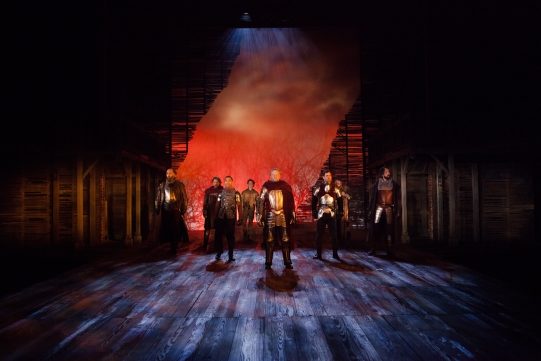A new edition of Shakespeare’s works has identified Christopher Marlowe as a co-author. The editors of the New Oxford Shakespeare believe that Marlowe collaborated in Parts 1, 2 and 3 of Henry VI. The conclusion was reached on the advice of an “Attribution Board” of three specialists in the field of literary authorship.
I was one of the members of this board. I first used computers in the late 1980s for attribution and have worked in this area ever since. Still, as I have discovered, a new Shakespeare attribution (or indeed a de-attribution – when a work by a noted author turns out to be written by someone else) – meets an interesting range of responses.
The sceptics
Then there is the view that authors aren’t the most important creators of literary works. All authors borrow from a common stock of language, the genre of writing is all-important, and everyone in a given era or group shares so much in attitudes and expressions. In the case of Shakespeare, there is the added point that authors don’t seem to have mattered much then – plays were often printed with no author mentioned, or just mysterious initials.First, there are those who think that attribution – the process of finding an author for anonymous or disputed works – is itself misguided, because it doesn’t matter who wrote a play or an act or a scene. The work is interesting, or not, regardless of author.
Others think attribution, though important, is impossible. There is so much mutual influence, imitation, and even plagiarism that we can’t distinguish one author’s voice among all the noise of others.
A second often cited obstacle to reliable attribution is the fact that authors change their styles over their careers. There is early Shakespeare and late Shakespeare.
Plus the nature of drama is that the author doesn’t speak and creates all sorts of different voices, inevitably disguising his or her own style. Added to this are the problems of transmission. What happened between the author’s first hand-written version and the frail printed book that happens to have survived from the 1590s?
Last in this group of attribution sceptics are those who think “Shakespeare” is a fraud anyway – the plays were really written by a committee, or the Earl of Oxford, or Sir Henry Neville, or indeed Marlowe.
A second group is those who think that authorship attribution is important, and possible, but this particular one is wrong. There is a better candidate, they say, or the case is not properly conducted, so we must remain in doubt.
Two new plays credited to the Bard
Strange as it may seem after that litany of objections, Shakespeare attribution powers ahead and is now, with the new Oxford edition, changing how Shakespeare is read.
The edition includes 40 plays. Two new ones originally published anonymously, Arden of Faversham and Edward III, have been added to the usual tally of 38. New research in the Authorship Companion, which is to be published alongside the edition, strengthens the case that Shakespeare wrote parts of these two plays.
Of these 40, 12 are listed as collaborations between Shakespeare and other writers. The edition also includes two sets of scenes Shakespeare added to existing plays, The Spanish Tragedy and Sir Thomas More.
My view is that it does matter who wrote what. If we now know more about Shakespeare’s early collaborations, for instance, we can stop regarding unexpected styles in the plays as “apprentice work” and see them as simply a mixture of another writer.
On the question of internal variation cutting across the authorial voice, there are ways of testing this as a factor. We can set up an experiment to see whether with a given classifying system – a set of data, variables and procedures – we can tell Shakespeare’s writing from others despite the obstacles put in the way by the nature of drama, the influence of genres, and authors changing styles over their career. This testing generally shows that while the other factors do matter, they don’t drown out the voice of the author.When we thought the poem A Funerall Elegie was Shakespeare’s, it was not only of intense interest in itself, but changed what “Shakespeare” is. Now that we know it is by Shakespeare’s fellow playwright John Ford, there will be fewer people reading it, inevitably, and “Shakespeare” changes again.
This self-testing aspect is the most reassuring part of attributing (say) parts of the three Henry VI plays to Marlowe, the author of Tamburlaine, Doctor Faustus and Edward II, who died at just 29. Using the same method, we can see whether when we treat parts of known Shakespeare and known Marlowe as anonymous we get a reliable attribution.
How were the Henry VI plays written?
There is a long tradition of authorship work on Shakespeare, going back to the 18th century, and many people around the world, in universities and outside them, involved. What has happened with the Henry VI plays is that older ideas that Shakespeare was influenced by Marlowe and closely imitated him gave way to suggestions that Marlowe wrote parts of the plays.
Probably the two playwrights were commissioned by a theatre company to write designated separate sections within a plot that was given them. In the first two parts, for instance, Marlowe’s work seems to have focused on the characters Joan la Pucelle (Joan of Arc) and the rebel Jack Cade.
An independent scholar, Tom Merriam, first argued this on the basis of Marlowe-like phrases in the first part of the play. My own work in a 2009 book supported this and added sections of the second part. Newer work on very rare phrases by John V Nance and Gary Taylor, and tests using networks of words by Gabriel Egan and others, have confirmed it. John Burrows, the doyen of computational stylistics, and I have a chapter in the Authorship Companion adding sections of Henry VI, Part 3, to the tally of Marlowe contributions.
Thus there is now a body of work published and forthcoming from the New Oxford Shakespeare team, which we believe is state of the art and as rigorous as we can make it. Nevertheless not everyone will be persuaded, and that is their right.
But what about Thomas Kyd?
For instance, a recent article by Darren Freebury-Jones argues that it was Marlowe’s fellow dramatist Kyd who collaborated with Shakespeare on the first part of Henry VI, and Shakespeare alone who wrote the other two.
My answer would be that all these questions can be tested, and indeed have been, and that while there will never be complete certainty, we can show that there is a high degree of reliability. And of course, these doubts about reliability also apply to the work Freebury-Jones cites in favour of his alternative attributions.In specific criticisms of the Marlowe attribution work, Freebury-Jones wonders if individual words taken out of context are reliable for attribution, whether shared phrases need to be vetted to see if they are really evidence of a single mind at work, and whether the numbers of words and phrases can ever distinguish between other writers.
Ultimately we have to return to the detailed work presented in published articles and books. By my count, Freebury-Jones mentions three experts other than himself who support his views on the authorship of the Henry VI plays. None of them has published their work on this topic in an article or a book as far as I am aware.
It’s a risk going out there with a Shakespeare attribution, but we do think that it matters who wrote what, that it’s possible to be pretty sure in some cases, and that we have done our due diligence in what we are proposing in the edition.
![]()
Hugh Craig is Professor of English at the University of Newcastle
This article was originally published on The Conversation. Read the original article.
This post was written by the author in their personal capacity.The opinions expressed in this article are the author’s own and do not reflect the view of The Theatre Times, their staff or collaborators.
This post was written by Hugh Craig.
The views expressed here belong to the author and do not necessarily reflect our views and opinions.

















